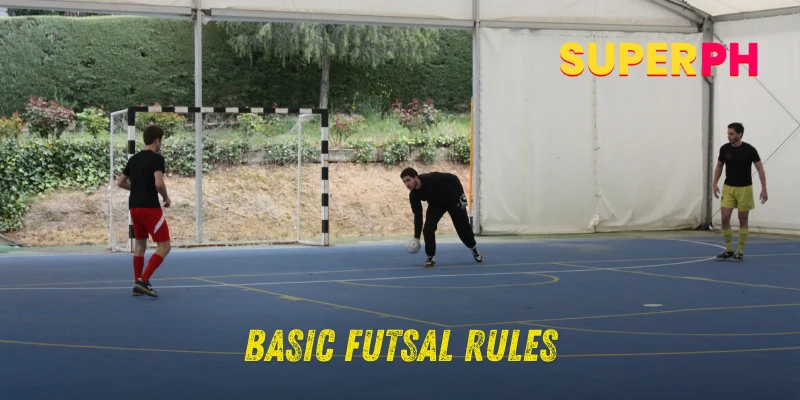What is Futsal? In the world of increasingly developing sports, Futsal is a term no longer unfamiliar to many people. Known as a compact version of soccer, Futsal has quickly attracted the attention of the sports-loving community with its exciting matches, high-class skills, and high fairness. But what is Futsal? If you’re still curious about this type of sport, join SuperPH to learn about Futsal – the sport that’s “creating a fever” worldwide!
What is Futsal?
Futsal is an indoor sport, similar to soccer, but played on a smaller field and with a limited number of players. The name “futsal” is an abbreviation of the Portuguese phrase “futebol de salão,” which means “indoor soccer.”

History of Futsal Formation and Development
Futsal is believed to have been born in Uruguay in the 1930s. Initially, it was played on outdoor soccer fields, in neighborhoods and small school yards in Montevideo, the capital of Uruguay. Players used regular soccer balls, but the limited space made the game fast-paced and technical.
After being introduced to Europe by Uruguayan citizens, Futsal quickly spread to other countries such as Brazil, Spain, Portugal, and Italy in the 1940s and 1950s. In these countries, Futsal became part of the local sports culture and attracted the interest of many players and fans.

In 1971, the International Futsal Federation (AMF) was established in São Paulo, Brazil. AMF was the first international organization to manage and develop Futsal as an independent sport with its own rules.
In 1989, FIFA, the world soccer governing body, recognized Futsal as an independent sport and established the World Futsal Federation (AMF) to manage and develop Futsal globally. FIFA established new rules and definitions for Futsal, including field dimensions, number of players, competition rules, and other regulations.
After being recognized by FIFA, Futsal has developed strongly worldwide. Many international Futsal tournaments have been organized, attracting the participation of national teams from around the world. Notable tournaments include the FIFA Futsal World Cup (organized by FIFA), AFC Futsal Championship (organized by the Asian Football Confederation), UEFA Futsal Euro (organized by the European Football Confederation), and many other international Futsal tournaments.
Beyond international competitions, Futsal has also become a popular sport in recreational activities, especially in urban areas and indoor sports centers. Many Futsal clubs have been established worldwide, providing opportunities for Futsal players to participate in local, national, and international tournaments.
Futsal has become a highly professional sport, with national teams, clubs, players, and coaches having high professional and technical preparation. It has also been considered a tool for developing technical and soccer skills for young players, helping them develop better in passing skills, ball control, and quick decision-making in tight spaces.
>> Read more: Why Isn’t Erling Haaland in Euro 2024? Which Team Does He Play For?
Getting Started with Futsal
To get started with futsal, players need to understand the basic rules of the game. Futsal is played on a small, narrow court, measuring 25-42m long and 16-25m wide, with specific regulations regarding the height and type of floor. The lineup consists of 5 players, including 4 field players and 1 goalkeeper. The game starts with each team kicking the ball from their own goal and trying to get the ball into the opponent’s net to score.
Every player in futsal needs technique and agility. Players need to have good ball control, flexible movement, accurate ball play, and make correct decisions in a short time. Goalkeepers also play an important role in futsal, needing ball-catching skills, game reading, and quick reactions to keep the net intact.
In addition, the kicking technique in futsal is somewhat different from traditional soccer. Because of the small, narrow field and the limited number of players, players need to kick the ball quickly, accurately, and with short range. Important techniques include running with the ball, dribbling, pivoting, and accurate finishing. Moreover, regulations on free kicks, corner kicks, substitutions, and match time also need to be well understood.
Basic Futsal Rules
Futsal rules are a variant of traditional soccer, designed to be played indoors or on smaller fields. Below are some basic rules of Futsal:
Number of players: Each team has 5 players, including the goalkeeper.
Substitutions: Players can be substituted at any time during the match, even the goalkeeper. The goalkeeper can only be replaced by exiting the field without needing the referee’s permission.
Match time: Match time is usually 2 halves, each half lasting from 10 to 20 minutes, depending on the regulations of the tournament or the organizing body.
Ball: The Futsal ball is usually smaller than the traditional soccer ball, with a standard size and weight of size 4 and about 400-440g.
Goalkeeper: The goalkeeper is the only player allowed to use hands or arms to touch the ball in their penalty area. However, the goalkeeper is not allowed to use hands or arms to touch the ball when the ball is thrown from the goalkeeper’s foot without touching the ground or any other player. With the characteristic of Futsal requiring quick attacking phases initiated by the goalkeepers, gloves are not frequently used in Futsal; instead, sports tape is used.
Corner kick: A corner kick is taken when the ball goes out of bounds of the home team. The corner kick is performed by placing the ball at the point of infringement and then kicking from there.
Penalty kick: A penalty kick is taken when there is a foul in the penalty area of the home team. The player will stand at the place of the foul and take the kick without a run-up.
Injury time: Injury time is only counted when the referee decides to stop the match in special cases or there are changes in the home team lineup.
These are some basic rules of Futsal Law. However, detailed rules may vary depending on each tournament or organizing body. Therefore, before participating in a Futsal match, you should familiarize yourself with the rules of the specific tournament or organization where you will play to ensure compliance with the regulations.

Additionally, in futsal, players often need to have the ability to play fast, with high technique, attacking and defending flexibly due to the smaller field area compared to traditional soccer. The flexibility and versatility of players in each position is an important factor in the success of a futsal team.
Conclusion About What is Futsal?
If you are new to Futsal, hopefully the detailed guide above has provided you with basic knowledge about this sport. Learn more, practice skills, participate in tournaments or Futsal teams to gain practical experience and improve your abilities. Wishing you exciting experiences and success in your journey to conquer Futsal!

